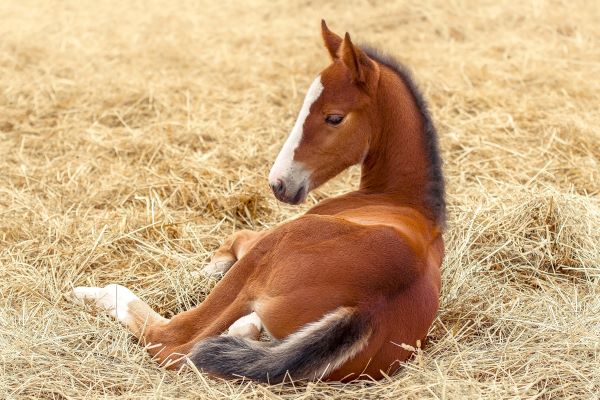24 hour contact: 01707 666297
New RVC research finds inbreeding is contributing factor to mid and late-term pregnancy loss in Thoroughbreds
New research from the Royal Veterinary College (RVC), in collaboration with Cornell University, has found that inbreeding is a contributing factor to mid and late-term pregnancy loss (MLPL), but not early pregnancy loss (EPL) in Thoroughbreds. This is the first study which explores the effect of genomic inbreeding levels on late term pregnancy loss in the horse and will help inform mating choices to minimise the risk of miscarriages in Thoroughbreds.

Inbreeding is a common practice in the livestock industry because individuals with desirable traits are highly prized for breeding. However, excessive inbreeding is known to increase the probability of uncovering homozygous recessive genotypes which have previously been associated with an increased risk of retained placenta and lower semen quality in horses.
Approximately five to 10 per cent of equine pregnancies end in early pregnancy loss and a further seven percent of pregnancies are lost between Day 70 of gestation and 24 hours post parturition (MLPL). However, to date, there has been no definitive analysis to investigate the association between genomic inbreeding levels and pregnancy loss in horses.
Therefore, the research team, led by Dr Jessica Lawson, Alborada Trust Research Fellow at the RVC, and Professor de Mestre at the Baker Institute for Animal Health at Cornell University, together with previous PhD student at the RVC, Dr Charlotte Shilton, analysed DNA samples from 189 individuals, including a control group. The study found that Thoroughbred pregnancies lost in mid and late gestation (MLPL) had significantly higher inbreeding metrics than UK Thoroughbred adults. However, pregnancies lost early in gestation (EPLs) showed no significant difference in inbreeding metrics compared to the adults.
Whilst Thoroughbred breeders make careful selection of their mating and breeding choices, this research shows the critical importance of cognisance in mating decisions in the industry. These findings also highlight the need for further research to continue to identify and characterise genomic changes which may be lethal to the pregnancy.
Dr Jessica Lawson, Alborada Trust Research Fellow at the RVC, said:
“This research provides critical evidence showing that mating highly related individuals does have a tangible effect on our breeding operations, as there is a real risk of a mare losing her pregnancy late in gestation and failing to produce a foal at all that season.
“The take home from our work should be to carefully consider breeding choices that involve mating of highly related individuals as, ultimately, this may increase the chance of the foal inheriting mutations which may not be compatible with life. We are already working on the next step, looking to identify these changes so more specific advice can be provided in the future”.
This research was funded by the Thoroughbred Breeders Association, Horserace Betting Levy Board, the Alborada Trust, and partial PhD studentship funding from the Royal Veterinary College's Paul Mellon Trust for Equine Research.
The Royal Veterinary College provides equine reproductive services and neonatal support at the equine hospital and practice in South Hertfordshire.
Notes to Editors
Reference
Lawson JM, Shilton CA, Lindsay-McGee V, Psifidi A, Wathes DC, Raudsepp T, et al. Does inbreeding contribute to pregnancy loss in Thoroughbred horses? Equine Vet J. 2024. https://doi.org/10.1111/evj.14057
The article is available to read here: https://beva.onlinelibrary.wiley.com/doi/10.1111/evj.14057
More information about the RVC’s equine reproductive services and neonatal support can be found at: https://rvc.uk.com/equine-reproductive-services
For media enquiries, please contact:
- Jasmin De Vivo at jasmin.devivo@plmr.co.uk or rvc@plmr.co.uk
- Press Line: 0800 368 9520
About the RVC
- The Royal Veterinary College (RVC) is the UK's largest and longest established independent veterinary school and is a Member Institution of the University of London.
- It is one of the few veterinary schools in the world that hold accreditations from the RCVS in the UK (with reciprocal recognition from the AVBC for Australasia, the VCI for Ireland and the SAVC for South Africa), the EAEVE in the EU, and the AVMA in the USA and Canada.
- The RVC is ranked as the top veterinary school in the world in the QS World University Rankings by subject, 2023.
- The RVC offers undergraduate and postgraduate programmes in veterinary medicine, veterinary nursing and biological sciences.
- The RVC is a research-led institution, with 88% of its research rated as internationally excellent or world class in the Research Excellence Framework 2021.
- The RVC provides animal owners and the veterinary profession with access to expert veterinary care and advice through its teaching hospitals and first opinion practices in London and Hertfordshire.

